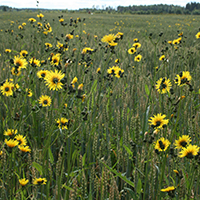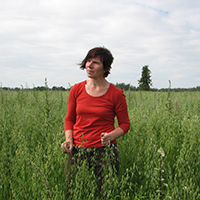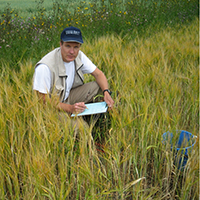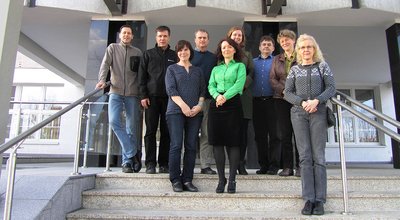PRODIVA
Crop diversification and weeds
Introduction to PRODIVA
PRODIVA will improve the understanding of crop diversification and its impact on weeds. The project seeks to produce results and guidelines for the application of crop diversification measures that will improve the management of weeds.
Weed problems remain to be a major constrain for the improvement of crop productivity in organic farming. There is a constant need for preventive tactics to limit undesired weed interference. Investigations undertaken in Finland, Sweden, Latvia, Poland and Germany aim to clarify the prospects of using crop diversification tactics for weed management purposes.
Background
Despite the need for weed management to preserve crop yield, organic cropping systems strongly contribute to maintain and support diverse weed communities on arable fields. Direct control actions are motivated to instantly release the crop from weed interference. However, the reliance on direct tactics could be reduced through careful planning of cropping systems that mitigate severe weed problems and create a more balanced and manageable weed flora. Diversifying crop components in cropping systems is a way to achieve this but it has not been exploited in practise.
Main project acitvities
- Relevant data from previous and running crop rotation experiments are extracted and analyzed
- The suppressive ability of cover crops against weeds will be quantified
- Crop species mixtures and their relevance for weed suppression are experimentally studied
- Similarly, variety mixtures of oat and spring barley varieties, respectively, are studied in field experiments in three countries
- 200 fields with spring barley will be surveyed during two growing seasons in order to indentify any associations between cropping system diversity and weed flora
- A database with all cropping information collected from the surveyed fields will be established
Benefits and results
Expected societal benefits of the project
It is anticipated that PRODIVA can help improving growers’ awareness about the benefits of cropping system diversification measures as tools to balance weed problems. The need for direct and costly weed control measures may be lessened, which limits fossil energy consumption and maintains beneficial weed diversity and thus biological diversity. The cropping practices studied in PRODIVA are valid not only for organic production but for conventional cropping as well to reduce current reliance on chemical weed control as required according to the recently introduced IPM policy of the EU.
Expected outcomes, results and impact
PRODIVA will:
- create the understanding of crop sequencing (main crops and cover crops) as an important tool for manipulating weed growth
- identify and describe the traits in crops and cover crops which determine crop-weed interactions and may become useful components in diversification program to suppress weeds
- produce ‘ready-to-use’ information on variety traits and optimal variety blends providing weed suppression
- yield results from weed surveying that reveal similarities and differences between the participating regions. Background field management data will deliver sources of variation, detected by appropriate statistical analyses. Comparisons with the results from the other work packages are expected to unravel similarities or differences with the survey data, which enable stakeholders to judge the practical relevance of crop diversification methods.
Expected long-term impact
PRODIVA aim to increase the awareness of growers and consultants on the positive effects of diversifying organic cropping systems. Correspondingly, it is anticipated that especially cover crops and cereal variety blends for weed management will acquire a strong place in future research programmes.
How to reach target groups
Stakeholder networks that include farmers, advisors and educators are set-up in every participating country. Considerable interaction with these groups will take place during the life-time of the project. In addition more traditional dissemination sources will be used such as peer-reviewed papers, conference papers, contributions at growers meetings and popular articles.
Leaflets from PRODIVA
Geographical distribution of challenging weed species
Geographical distribution of challenging weed species
Geograficzne rozmieszczenie wasnych gatunków chwastów
Kevätviljapeltojen haasteellisia rikkakasveja
Problemātisko nezāļu sugu ģeogrāfiskā izplatība
Räumliche Verteilung von wichtigen Unkrautarten
Vigtige ukrudtsarter i Østersø-regionen
Viktiga ogräsarter i Östersjöregionen
Articles from PRODIVA
A successful grain crop is the best weed management (English article)
Pitkäjänteista rikkakasvien torjuntaa luomutiloilla (Finnish article)
Weed management with cover crops in the Nordic-Baltic region – a snapshot from the references
Cover crops have gained popularity in cereal cropping, where they improve soil fertility and quality. The potential for using cover crops in weed management is an interesting but little addressed option in organic arable crop production. Some comments on feasible measures for cereal production are extracted in this round-up from the references and information relevant to the Nordic-Baltic region.
- Read the article written by Jukka Salonen, Kari Koppelmäki and Hannu Känkänen
- Visit Organic Eprints and find
publications from the project.
More about the project
Coordinator of Prodiva
- Bo Melander,
Department of Agroecology - Crop Health, Aarhus University
Mail: bo.melander@agro.au.dk



Project partners
Jukka Salonen, Natural Resources Institute Finland, Finland
Theo Verwijst & Anneli Lundkvist, Swedish University of Agricultural Sciences, Department of Crop Production Ecology, Sweden
Bärbel Gerowitt, University of Rostock – Crop Health, Germany
Roman Krawczyk & Sylwia Kaczmarek, Institute of Plant Protection – National Research Institute, Poland
Livija Zarina, State Priekuli Plant Breeding Institute (starting 01.01.2016 consolidated as Institute of Agricultural Resources and Economics), Latvia

The project PRODIVA is funded by ERA-Net CORE Organic Plus Funding Bodies partners of the European Union’s FP7 research and innovation programme under the grant agreement No. 618107.
